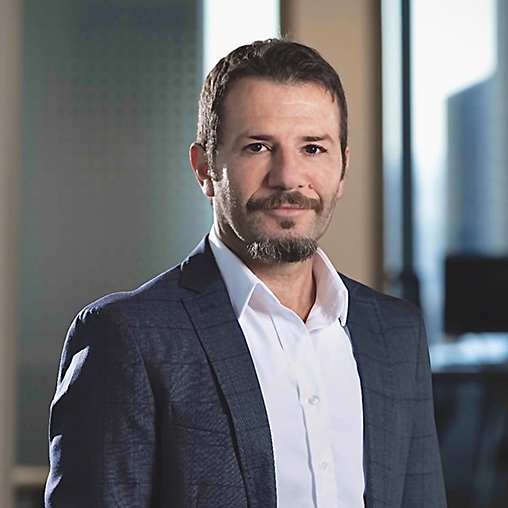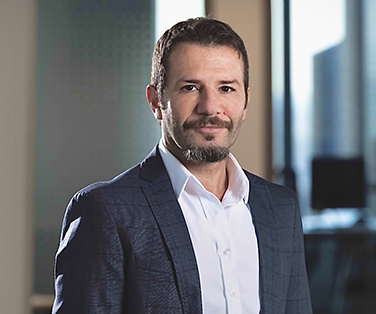Amgen saw a lot of exciting milestones in 2019, from advances in oncology, to collaboration on the largest and most comprehensive DNA mapping effort from a single population in the United States. This was also the year that Amgen saw significant growth from its recent expansion into the field of biosimilar medications.
Biosimilars are biologic medications that are highly similar to existing licensed biologic products (often referred to as reference or originator products) with no clinically meaningful differences in terms of safety and efficacy (learn more here). From product launches and pipeline advancements to advocating for policies in support of sustainable healthcare markets for patients, news about Amgen’s biosimilars came at a steady clip in 2019—and that includes a new general manager.
Earlier this year, Alper Ureten accepted a new role leading Amgen’s Biosimilars Business Unit (BBU), relocating with his wife and three sons from their home country of Turkey to Amgen’s headquarters in Thousand Oaks, Calif. He first joined Amgen in 2014 as general manager of Amgen’s Turkey affiliate Mustafa Nevzat, a local generics company Amgen acquired in 2012.
As 2019 comes to a close, Ureten explains why Amgen’s 40 years of experience developing and manufacturing biologic medicines uniquely positions the company to become an industry leader in the development and manufacturing of biosimilars.
What inspired you to relocate from Turkey to Amgen headquarters?
I was excited to join Amgen in 2014 because the company offered me a unique and challenging opportunity to do something I hadn't done before—managing an innovative business and a generics business at the same time. I feel the same about this opportunity to lead the biosimilars group. Biosimilars are a new and dynamic part of the biotech industry. Biosimilars can potentially offer more affordable biological treatment options for patients with serious illnesses, like inflammatory diseases and some cancers.
Can you share your vision for Amgen’s biosimilars business?
Amgen is a biologics leader driven by its mission to serve patients, and the biosimilars business helps us broaden that mission. My vision is for Amgen to continue building on the successes of the past year and become an industry leader in biosimilars, matching the reputation for safety and reliability of Amgen’s innovative medicines.
Why is there unpredictability in the biosimilars marketplace?
Biosimilars are still relatively new to healthcare systems around the world. There are many different viewpoints across the healthcare landscape about how to define biosimilar success and how to achieve a sustainable biologics marketplace over the long term. There’s also great diversity in how regions around the world approach the approval, regulation, and reimbursement of biosimilars. Regulatory and reimbursement frameworks for biosimilars are well established yet dynamic in Europe, developed yet under continuing debate in the U.S., and less mature in some other countries around the world.
Amgen advocates for policies that support both innovation in original biologic medicines and competition from biosimilars. This will promote development of life-altering medicines as well as bring meaningful cost savings to healthcare systems.
What do you want people to understand about biosimilars?
The most important thing to understand is that the biosimilars business creates value not just for Amgen, but also for healthcare systems and for patients. It is a business that has started to generate good financial returns, and it supports Amgen’s broader ability to innovate new medicines and to make those medicines available for patients.
There are many challenges unique to biosimilar development and commercialization. For example, compared with creating a novel biologic, creating a biosimilar is challenging because the manufacturing process for a biosimilar must be specifically designed to produce a product that matches the target characteristics of the reference product. We also need to execute with speed, cost efficiency and forecast accuracy because these factors can make all the difference for the availability of these medicines around the world.
Amgen also needs to navigate regulatory policy in developing countries and emerging markets where biosimilar pathways and policies either don’t exist or are in early stages of development. Additionally, in the U.S., there is a need to educate policymakers and the media that there is strong evidence biosimilars are beginning to achieve their intended purpose. Further, in the EU there is a need to advocate for policies that will support a sustainable, competitive marketplace for biosimilars.
How do you feel about Amgen’s progress in biosimilars and what’s on the horizon?
I’m really impressed at how many biosimilar medicines we’ve advanced to the marketplace globally over the past year, not to mention the large number of patients that are already getting these medicines in the relatively short time they’ve been available. As for what’s next, Amgen will continue to successfully launch more biosimilar products across the globe, and we expect this expanding pipeline to be an important growth opportunity for Amgen in the years ahead.


